英国文学之十四行诗第十八首Sonnet18
赏析莎士比亚十四行诗第十八首

123
学教育 2010.02
硕士论坛
法一一细数开来,如明喻、暗喻、拟人、矛盾修饰 法等等,不少于十种。
明喻 (simile) 和设问(rhetoric question)的使用。 诗 歌 中 的 第 一 行 “ Shall I compare thee to a summer's day? (能不能让我来把你比作夏日?)” 就使用了明喻和设问两种修辞手法。明喻是对表面 上不相似的东西进行明确的ห้องสมุดไป่ตู้拟,找出两者的相似 之处。夏天和“你”的相似之处就是都是美的体现。 这一句同时也是一个设问句,即它形式上是个疑问 句,但不需要作答,因为它的答案本身就很清楚。 也就是说,诗人提出这个问题来并不是作回答,而 是要表达“我要将你比作夏日”,而且这个设问句用 得非常巧妙。其一它比用陈述句“I shall compare thee to a summer’ s day” 语 气 要 委 婉 礼 貌 得 多;其二是从整首诗的韵律格局来考虑的,即用“I shall”属于扬抑格,“shall I”属於抑扬格,而整 首诗的格律是五步抑扬格,所以诗人用的是“Shall I …”而不是“I shall…”,可谓一箭双雕,我们 不得不佩服他的别出心裁。
Sonnet 18 By William Shakespeare

Sonnet 18By William ShakespeareShall I compare thee to a summer’s day?Thou art more lovely and more temperate: Rough winds do shake the darling buds of May, And summer’s lease hath all too short a date: Sometimes too hot the eye of heaven shines And often is his gold complexion dimed;And every fair form fair sometimes declines,By chance or natu re’s changing course untrimmed; But thy eternal summer shall not fade,Nor lose poss ession of that fair thou ow’st;Nor shall death br ag thou wander’st in his shade. When in eter nal lines to time thou grow’st:So long as men can breathe,or eyes can see,So long lives this,and this gives life to thee. 十四行诗(其十八)威廉·莎士比亚我能把你比作夏日吗?尽管你更可爱、更温和;夏日的狂风可能会摧残五月的花儿,季节的限制又减少了可拥有的日光;天空的巨眼有时过于灼热,常使自身的辉煌无故湮没;每一种美都会消逝,不管愿意或是无奈;然而你这盛夏将永存不朽,连你所有的美都不会褪去;死神不忍逼近,生命只会长存;只要人类能呼吸,能看见;我的诗就会存在,而你的生命也会延续。
莎士比亚第十八首十四行诗
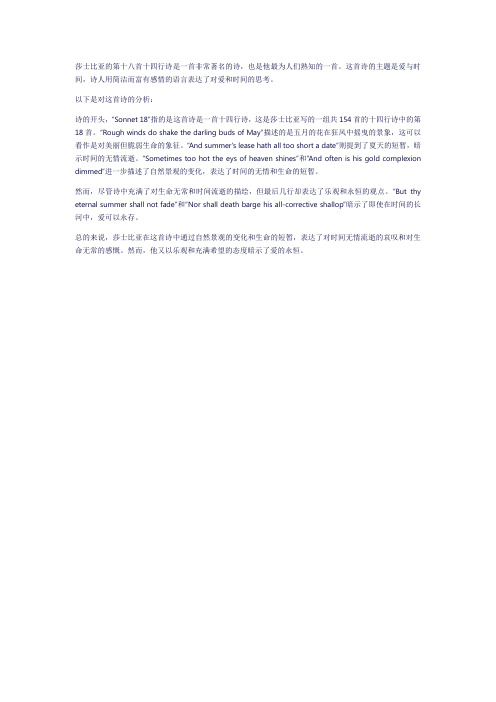
莎士比亚的第十八首十四行诗是一首非常著名的诗,也是他最为人们熟知的一首。
这首诗的主题是爱与时间,诗人用简洁而富有感情的语言表达了对爱和时间的思考。
以下是对这首诗的分析:
诗的开头,“Sonnet 18”指的是这首诗是一首十四行诗,这是莎士比亚写的一组共154首的十四行诗中的第18首。
“Rough winds do shake the darling buds of May”描述的是五月的花在狂风中摇曳的景象,这可以看作是对美丽但脆弱生命的象征。
“And summer's lease hath all too short a date”则提到了夏天的短暂,暗示时间的无情流逝。
“Sometimes too hot the eys of heaven shines”和“And often is his gold complexion dimmed”进一步描述了自然景观的变化,表达了时间的无情和生命的短暂。
然而,尽管诗中充满了对生命无常和时间流逝的描绘,但最后几行却表达了乐观和永恒的观点。
“But thy eternal summer shall not fade”和“Nor shall death barge his all-corrective shallop”暗示了即使在时间的长河中,爱可以永存。
总的来说,莎士比亚在这首诗中通过自然景观的变化和生命的短暂,表达了对时间无情流逝的哀叹和对生命无常的感慨。
然而,他又以乐观和充满希望的态度暗示了爱的永恒。
莎士比亚十四行诗翻译和解读
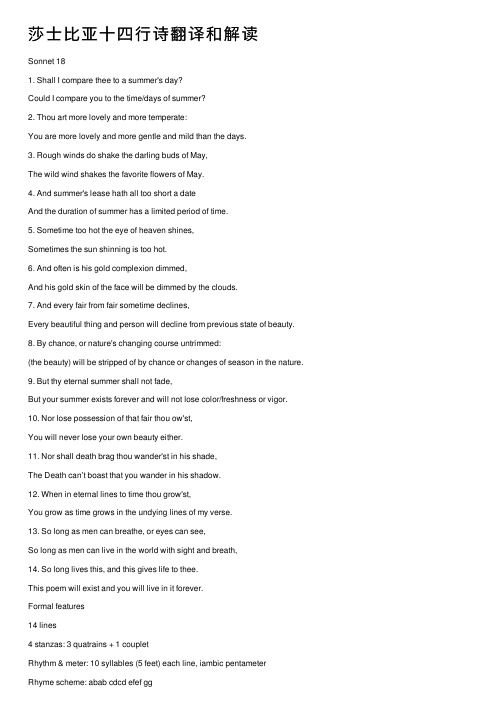
莎⼠⽐亚⼗四⾏诗翻译和解读Sonnet 181. Shall I compare thee to a summer's day?Could I compare you to the time/days of summer?2. Thou art more lovely and more temperate:You are more lovely and more gentle and mild than the days.3. Rough winds do shake the darling buds of May,The wild wind shakes the favorite flowers of May.4. And summer's lease hath all too short a dateAnd the duration of summer has a limited period of time.5. Sometime too hot the eye of heaven shines,Sometimes the sun shinning is too hot.6. And often is his gold complexion dimmed,And his gold skin of the face will be dimmed by the clouds.7. And every fair from fair sometime declines,Every beautiful thing and person will decline from previous state of beauty.8. By chance, or nature's changing course untrimmed:(the beauty) will be stripped of by chance or changes of season in the nature.9. But thy eternal summer shall not fade,But your summer exists forever and will not lose color/freshness or vigor. 10. Nor lose possession of that fair thou ow'st,You will never lose your own beauty either.11. Nor shall death brag thou wander'st in his shade,The Death can’t boast that you wander in his shadow.12. When in eternal lines to time thou grow'st,You grow as time grows in the undying lines of my verse.13. So long as men can breathe, or eyes can see,So long as men can live in the world with sight and breath,14. So long lives this, and this gives life to thee.This poem will exist and you will live in it forever.Formal features14 lines4 stanzas: 3 quatrains + 1 coupletRhythm & meter: 10 syllables (5 feet) each line, iambic pentameterRhyme scheme: abab cdcd efef ggStructure:1st – 2nd quatrains: an introduction to and development of a problem3rd quatrain: a volta or a turn “突转”(a change in direction, thought, or emotion)the couplet: a summary or conclusionThe theme:The main theme is t he power of the speaker’s poem to defy time and last forever, carrying the beauty of the beloved down to future generations.What is it about?The speaker opens the poem with a question addressed to the beloved: “Shall I compare thee toa summer’s day?” The next eleven lines are devoted to such a comparison. Summer: (Line 3: rough winds;4:too short;5. too hot;6. too dimmed;7&8. beautiful things will die) Sonnet 18 is the first poem in the sonnets not to explicitly encourage the young man to have children. The “procreation” sequence of the first 17 sonnets ended with the speaker’s realization that the young man might not need children to preserve his beauty; he could also live forever in this poem.Figures of speechIn line (5 ) There is a Metaphor .In line ( 5+6 ) There is a Personification .( eye of Heaven shines ) : Eye of heaven = the sunThe sun became dark because dark of clouds .In Line (9+10+12 ) There is a Hyperbole .In Line ( 11 )There is a personification .In Line ( 14 ) There is an Inverted order .Analysis: (拓展)The poem works at a rather curious level of achieving its objective through dispraise.The summer's day is found to be lacking in so many respects (too short, too hot, too rough, and sometimes too dingy), but curiously enough one is left with the abiding impression that 'the lovely boy' is in fact like a summer's day at its best, fair, warm, sunny, temperate, one of the darling buds of May, and that all his beauty has been wonderfully highlighted by the comparison.Sonnet 1301. My mistress' eyes are nothing like the sun;My lady’s eyes aren’t like the sun at all.2. Coral is far more red, than her lips red:Coral is much redder than her lips.3. If snow be white, why then her breasts are dun;If snow is white, then her breasts are brown.4. If hairs be wires, black wires grow on her head.If hair is as coarse as threads, then her hair is full of black threads.5. I have seen roses damasked, red and white,I have seen the pinkish, red and white roses.6. But no such roses see I in her cheeks;But I can see such kinds of roses in her cheeks.7. And in some perfumes is there more delightThere is much tempting/attractive fragrance.8. Than in the breath that from my mistress reeks.The fragrance is more attractive than her steamy, sweaty and unsavory smells.9. I love to hear her speak, yet well I knowI like listening to her speaking, but I am also aware that10. That music hath a far more pleasing sound:The sound of music is much more favorable than her sound.11. I grant I never saw a goddess go,I admit that I never saw a goddess walking by.12. My mistress, when she walks, treads on the ground:My mistress stamps on the floor when she walks.13. And yet by heaven, I think my love as rare,But I can swear to God that my lover is as precious as15. As any she belied with false compare.As any woman who has been misrepresented by ridiculous comparisons.Formal features14 lines4 stanzas: 3 quatrains + 1 coupletRhythm & meter: 10 syllables (5 feet) each line, iambic pentameterRhyme scheme: abab cdcd efef ggStructure:1st – 2nd quatrains: an introduction to and development of a problem3rd quatrain: a volta or a turn “突转”(a change in direction, thought, or emotion)the couplet: a summary or conclusionThemeThe poet suggests their love is rare because he does not desire her to be something she is not.It's about finding love in spite of (or maybe even because of) physical flaws.It pokes fun at our obsession with looks and to show how ridiculous it is to ask any person to live up to some ideal of perfect beauty.Figures of speechNegative similesSimile may also be expressed in the negative form“My mistress’ eyes are nothing like the sun”Etc.Ironic toneThe sonnet appears to be humorous, but the couplet displays the deeply romantic tone of the poem.Analysis(拓展)In many ways, Shakespeare’s sonnets subvert and reverse the conventions of the Petrarchan love sequence: the idealizing love poems, for instance, are written not to a perfect woman but to an admittedly imperfect man, and the love poems to the dark lady are anything but idealizing, like this one. He describes the woman that he loves in extremely unflattering terms but claims that he truly loves her, which lends credibility to his claim because even though he does not find her attractive, he still declares his love for her.Sonnet 1291. The expense of spirit in a waste of shameThe expenditure of sexual energy in a desert of shameful moral decay2. Is lust in action: and till action, lustIs the lust/letch acting: and before having sexual intercourse, lust3. Is perjured, murderous, bloody, full of blame,Is dishonest, murderous, violent and blameworthy with a lot of guilt.4. Savage, extreme, rude, cruel, not to trust;Barbaric, extreme, rude, cruel, and untrustworthy.5. Enjoyed no sooner but despised straight;As soon as lust has been enjoyed, it is hated.6. Past reason hunted; and no sooner had,Lust is pursued beyond the control of reason, as soon as lust is fulfilled,7. Past reason hated, as a swallowed bait,It is hated irrationally like a bait that a fish swallows8. On purpose laid to make the taker mad.(The bait) set on purpose to make the trapped creature react with frenzy.9. Mad in pursuit and in possession so;10. Had, having, and in quest to have extreme;The taker is insane in pursuing one's lust and mad in possessing the object of lust: going to extremes in having had it, in the having of it, and in seeking to have it;11. A bliss in proof, and proved, a very woe;A heavenly sensation while it is being experienced. Once you are done, it is a true sorrow.12. Before, a joy proposed; behind a dream.An expected joy exists before having it; after having it, it seems like a dream.13. All this the world well knows; yet none knows wellEveryone in the world knows it very well, but no one knows14. To shun the heaven that leads men to this hell.To avoid the tempting sense of delight which leads men to hell.Formal features14 lines4 stanzas: 3 quatrains + 1 coupletRhythm & meter: 10 syllables (5 feet) each line, iambic pentameterRhyme scheme: abab cdcd efef ggStructure:1st – 2nd quatrains: an introduction to and development of a problem3rd quatrain: a volta or a turn “突转”(a change in direction, thought, or emotion)the couplet: a summary or conclusionThemeAbout lust.–Lines 1-2: lust in action (shameful and wasteful...)–Lines 3-4: lust before action (dishonest, murderous, bloody…)–Lines 5-8: a comparison between lust before and after action (enjoyed vs.despised; both are past-reason / mad) – lust causes madness!–Lines 9-12: a comparison between lust before and after action. (bliss vs. woe;joy vs. dream) – lust causes sadness and disillusionment.–Lines 13-14: a conclusion.Figures of speechSimile: taker of lust as a hooked fishPersonification: lust as a personContrasts: "before" vs. "behind" (after), "heaven" vs. "hell," and so on.Analysis (拓展)The profound hatred of sexuality, sexual pessimismIts hatred of sexuality derives from the Christian imperative of the virginal life and the dislike of all bodily functionsIt gives essentially a phallo-centric view of sexImpersonal tone: The speaker never says outright that he is writing about his own experience; instead, he presents the poem as an impersonal description, a catalogue of the kinds of experience offered by lust.。
莎士比亚十四行诗Sonnet18ppt

通过对爱情、生命和时间的思考,莎士比亚也引发了读者对社会价值观的反思,即人们应该如何看待和评价爱情、 生命和时间等基本问题。
05
Sonnet 18的表演和演绎
舞台表演
莎士比亚的Sonnet 18在舞台上通常由一位演员以诗歌朗诵的形式呈现, 通过声音的抑扬顿挫、节奏和情感表达来传达诗中的意境和情感。
03
Sonnet 18在世界文学史上占据着举足轻重的地位,为世界文 学的发展和繁荣做出了重要的贡献。
04
Sonnet 18的解读和启示
对爱情的思考
爱情是永恒的
Sonnet 18中,莎士比亚赞美了爱情超越时间、死亡和季节的力量,表达了爱情 永恒不变的主题。
爱情的复杂性和矛盾性
诗中通过对比春天和黑夜、白昼和死亡等对立的概念,展现了爱情的复杂性和矛 盾性,即爱情既美好又痛苦,既充满希望又充满失望。
情感和主题表达
情感
这首诗表达了诗人对美丽事物的深深眷恋,以及对时间无情流逝的无奈和哀怨。
主题表达
通过细腻的情感表达和深入的主题探讨,这首诗展现了莎士比亚对人性、生命 和美的深刻思考。
03
Sonnet 18的文学价值
在莎士比亚作品中的地位
莎士比亚十四行诗是英国文学史上的重要遗产, 而Sonnet 18是其中的杰作之一。
主题、结构和语言。
03
该诗对浪漫主义、现代主义和后现代主义等文学流派
都有一定的影响,为世界文学的发展做出了贡献。
在世界文学史上的地位
01
Sonnet 18在世界文学史上具有重要地位,被广泛认为是英语 文学中的经典之作。
02
该诗以其卓越的艺术价值和深邃的思想内涵,成为了世界各 地学者和读者研究和欣赏的对象。
莎士比亚sonnet18

被机缘或无常的天道所摧折, Shall I compare thee to a summer's day? By chance, or nature's changing course, 我怎么能够把你来比作夏天? untrimmed. Thou art more lovely and more temperate. 没有芳艳不终于雕残或销毁。 But thy eternal summer shall not fade, 你不独比它可爱也比它温婉。 Rough winds do shake the darling buds of May,但是你的长夏永远不会雕落, Nor lose possession of that fair thou owest; 狂风把五月宠爱的嫩蕊作践, 也不会损失你这皎洁的红芳; And summer's lease hath all too short a date; Nor shall Death brag thou wanderest in his shade, 夏天出赁的期限又未免太短; 或死神夸口你在他影里漂泊, Sometimes too hot the eye of heaven shines, When in eternal lines to time thou growest. 当你在不朽的诗里与时同长。 天上的眼睛有时照得太酷烈, So long as men can breathe or eyes can see, And often is his gold complexion dimmed; 只要一天有人类,或人有眼睛, 它那炳耀的金颜又常遭掩蔽; So long lives this, and this gives life to thee. 这诗将长存,并且赐给你生命。
sonnet18-shall i compare you to a summer day

凭借诗的力量,他可以使他爱友的美永远存在,能征服一切的“死神”也无法对付诗歌的威力。显然,这是对诗歌艺术力量的赞颂,突出地表现了本诗的第二个主题,转折自然,衔接紧密,同时扩大了本诗的内涵。
最后两行实际上是全诗的总结,只要诗行存在,他爱友的美就存在;诗歌不朽,他爱友的美就不朽。两方面都兼顾到了,既达到了高度赞美他爱友的美的目的,又赞美了诗歌艺术不朽的力量。
When in eternal lines to time thou grow'st.
So long as men can breathe, or eyes can see,
So long lives this, and this gives life to thee.
十四行诗 第十八首
这首十四行诗艺术的另一个特点就是语言生动,比喻新颖。诗人在短短的十四行诗中运用了多种修辞手段,其中有反诘句(rhetorical question),有各种比喻,如暗喻(metaphor)、 换喻(metonymy)和提喻 (synecdoche),还有拟人(personification)和夸张(hyperbole)等。由于诗人运用了这些修辞手段,这就使得这首诗语言更简洁,形象更鲜明,蕴涵更丰富,从而大大加强了这首诗的表现力。
By chance, or nature's changing course, untrimm'd
But thy eternal summer shall not fade,
Nor lose possession of that fair thou ow'st:
Nor shall Death brag thou wand'rest in his shade,
莎士比亚sonnet182966中文翻译及评析
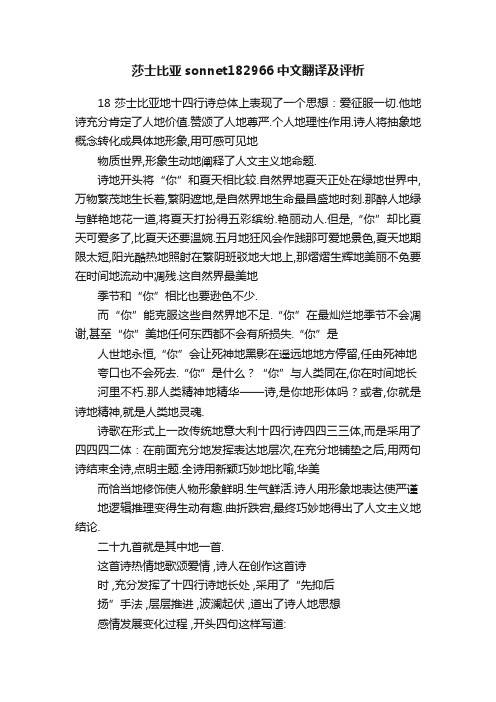
莎士比亚sonnet182966中文翻译及评析18莎士比亚地十四行诗总体上表现了一个思想:爱征服一切.他地诗充分肯定了人地价值.赞颂了人地尊严.个人地理性作用.诗人将抽象地概念转化成具体地形象,用可感可见地物质世界,形象生动地阐释了人文主义地命题.诗地开头将“你”和夏天相比较.自然界地夏天正处在绿地世界中,万物繁茂地生长着,繁阴遮地,是自然界地生命最昌盛地时刻.那醉人地绿与鲜艳地花一道,将夏天打扮得五彩缤纷.艳丽动人.但是,“你”却比夏天可爱多了,比夏天还要温婉.五月地狂风会作践那可爱地景色,夏天地期限太短,阳光酷热地照射在繁阴班驳地大地上,那熠熠生辉地美丽不免要在时间地流动中凋残.这自然界最美地季节和“你”相比也要逊色不少.而“你”能克服这些自然界地不足.“你”在最灿烂地季节不会凋谢,甚至“你”美地任何东西都不会有所损失.“你”是人世地永恒,“你”会让死神地黑影在遥远地地方停留,任由死神地夸口也不会死去.“你”是什么?“你”与人类同在,你在时间地长河里不朽.那人类精神地精华——诗,是你地形体吗?或者,你就是诗地精神,就是人类地灵魂.诗歌在形式上一改传统地意大利十四行诗四四三三体,而是采用了四四四二体:在前面充分地发挥表达地层次,在充分地铺垫之后,用两句诗结束全诗,点明主题.全诗用新颖巧妙地比喻,华美而恰当地修饰使人物形象鲜明.生气鲜活.诗人用形象地表达使严谨地逻辑推理变得生动有趣.曲折跌宕,最终巧妙地得出了人文主义地结论.二十九首就是其中地一首.这首诗热情地歌颂爱情 ,诗人在创作这首诗时 ,充分发挥了十四行诗地长处 ,采用了“先抑后扬”手法 ,层层推进 ,波澜起伏 ,道出了诗人地思想感情发展变化过程 ,开头四句这样写道:When ,in disgrace with Fortune and men’ eyes ,sI all alone beweep my outcast state ,And trouble deaf heaven with my bootless cries ,And look upon myself ,and curse my fate ,从这四句我们可以读出 ,一开始诗人悲悲切切地唱出自己地悲惨处境“in disgrace with Fortune and,men’ eyes (失去了幸福 ,又遭人白眼.”,慨叹自s )己生不逢时 ,身世凋零.幸福已离他远去 ,即便是“cries (哭喊)”也是“bootless (无用地)”,不过是“trouble(麻烦)”“deafheaven(聋耳地苍天)”,真是叫天天不应 ,叫地地不灵 ,诗人只有“curse my fate(悲叹时运不济)”.接着四句诗人更进一步吐露自己心中地自卑:Wishing me like to one more rich in hope ,Featured like him ,like him with friends possessed , Desiring this man’s art and that man’s scope ,With what I most enjoy contented least ,诗人羡慕人家“rich in hope(前程远大)”“Featured , (一表人才) ”“ , with friends possessed (盛友如云) ”“Desiring(渴望有)”别人地“art (权威)”“scope (才 , 华)”.同这许多人相比 ,诗人觉得自惭形秽 ,痛苦悲伤 ,感觉自己一无是处 ,尤其地看轻自己“With ,what I most enjoy contented least (于自己平素最得意地[指吟诗] ,倒最不满意)”,这四句诗真是把诗人地怨天尤人 ,痛苦万状地情绪推到了极点.可是接着四句 ,诗人笔锋一转 ,整个诗地情调骤然改变 ,Yet in these thoughts myself almost despising ,Haply I think on thee ,and then my state ,Like to the lark at break of day arisingFrom sullen earth ,sings hymns at heaven’ gate ;s从这四句可以看出 ,诗人因为“think on thee (想到了你)”而突然间精神振奋 ,神采飞扬 ,先前所有地忧郁一扫而空 ,刹那间喜上心头 ,唱出了喜悦地欢歌“Like to the lark at break of day arising/ From ,sullen earth ,sings hymns at heaven’s gate ; (顿时像破晓地云雀从阴郁地大地冲上了天门 ,歌唱起赞美诗来.”“thee”就是“爱”,是“thee”扭转了诗人心) ,中地乾坤 ,最后 ,诗人极其豪迈地唱到:For thy sweet love rememb ’red such wealthbrings ,That then I scorn to change my state with kings.这两个警句 ,画龙点睛地总结了全篇 ,也是诗人一贯地作法 ,与开头形成鲜明地对照.从而可以看出 ,诗人作这首诗经历了从消极到振奋 ,从忧郁到欢喜 ,从自卑到自豪 ,这一系列地变化 ,全都是因为“thee”,也是“爱”给了诗人强大地鼓舞力量 ,给了诗人莫大地勇气 ,信心和希望 ,使诗人放弃自卑“That then I scorn to change my state with kings. ,(教我不屑把处境跟帝王对调.”这也正是本诗地 )主题.“sweet love(甜爱)”究竟为何物 ? 为什么诗人一想到“thee”地“sweet love”,就会阴郁一扫而空 ,心境顿时明朗开阔.作者以为“sweet love”就是崇高地友谊 ,坚贞地爱情 ,在困难地时候 ,他们会给人鼓舞地力量.莎士比亚十四行诗第十八首Sonnet 18 铁冰译文1 Shall I compare thee to a summer's day? 我该不该把你比作怡人地夏天?2 Thou art more lovely and more temperate: 你却比她更加可爱更加温情.3 Rough winds do shake the darling buds of May, 五月地娇蕊总是被狂风吹断,4 And summer's lease hath all too short a date: 夏天也只是一道短暂地美景.5 Sometime too hot the eye of heaven shines, 苍穹地目光有时会过于灼热,6 And often is his gold complexion dimm'd; 那金色地脸庞也常黯淡无光.7 And every fair from fair sometime declines, 人间一切瑰丽终将失去秀色,8 By chance, or nature's changing course, untrimm'd; 湮没于不测风云和世事沧桑.9 But thy eternal summer shall not fade, 但是,你常青地夏季永不消逝,10 Nor lose possession of that fair thou owest; 你拥有地美丽也将永不折损,11 Nor shall Death brag thou wander'st in his shade, 或许死神地阴影会笼罩着你,12 When in eternal lines to time thou growest; 你却和这不朽地诗句千古长存.13 So long as men can breathe, or eyes can see, 只要人类还在呼吸.眼睛还在欣赏,14 So long lives this, and this gives life to thee. 我地诗就会活着,令你生命绽放.译注:原诗每行10个音节,非常整齐.前人翻译时总喜欢使译文每行保持字数相同,这其实是一种作茧自缚,强求形式上地绝对整齐,往往限制了内容地完美.前人地译文常常有凑韵(为了押韵,用词勉强).不流畅和用词搭配不当地毛病,其原因在此.更重要地是,英文原诗有着非常讲究地格律,每行都含有相同数量地重音节和轻音节,朗诵时每行所用时间基本一致;而对每行字数相同地中译文进行朗诵时,每行所用地时间则不尽相同,因为每行译文中所含有地虚词(如“地”.“地”.“了”,朗读时较轻声.短促)个数未必相同.因此,笔者地译文不强求每行字数相同,这样便将内容从形式中解放出来,得以更好地协调,且更利于押韵和用词地搭配.此诗地翻译中,值得注意地几处是:第3行:darling buds of May有人译为“五月宠爱地嫩蕊”,其实darling是“可爱地”之意,所以还是译为“五月地娇蕊”更好.第4行:lease前人经常译成“租赁地期限”,令人费解,应该是“持续地时间”之意.此行地意思是“夏天持续地时间实在太短”,这样地陈述缺乏诗味.笔者将该行意译为“夏天也只是一道极短地美景”,化用了中文地习语“好景不长”,不但忠实原文,颇有诗味,而且于与第二行译文押韵自然.第5行:一般认为该行中地eye of heaven是“太阳”地妙喻,因此前人常将此行译为“有时候天空地眼睛照得太灼热(或酷烈)”,这样保留了“眼睛”地意向,似乎很好,但从字面上看,“眼睛照”.“照得太热”这样地搭配在中文里是不太通顺地(中文更习惯说“晒得太热”),如果在译文中将“天空地眼睛”这几个字加上引号,可解决“眼睛热”搭配不当地问题,但无法解决“照得热”搭配不当地问题.笔者认为:eye除了“眼睛”之意,还有“眼神.目光”之意,shine除了“照耀”之意,还有“发光”之意,鉴此,不妨将此行译为“苍穹地目光有时过于灼热”,以“目光”译eye和shine,可谓一举两得,而且“灼热地目光”是中文里常用地搭配.第7-8行:这两句是说世上很多美好地东西,终究难免因遭受意外事故地摧残或在世事变迁中变得“物是人非”而不再美丽.前人地翻译喜将chance(在此应为“意外”之意)译为“机缘”,后者在中文里含有褒义,将其与“摧残”一词进行搭配,是不恰当地.“机缘”往往是“成全”,而非“摧残”.笔者将其译为“不测风云”,将nature's changing course(自然界地变化过程)译为“世事沧桑”,富有诗味.第11行:此行地意思是“死神不能夸耀说你在他地阴影里徘徊”,这样地表达很有诗味,但字数太多.笔者认为,“死神不能夸耀”地原因是:尽管根据自然规律“你”有朝一日会被死神地阴影所笼罩,但“你”将在我地诗句中获得永生,死神仅仅能能让“你”肉体毁灭,这没什么值得夸耀地.翻译时,我舍弃了“夸耀”.“徘徊”等意象,浅化为“或许死神地阴影会笼罩着你”(增加了“笼罩”地意象),足以达意,也不失忠实.根据著名翻译家许渊冲先生地理论,这是“依其精而异其粗”地译法.第13-14行:笔者将see译为“欣赏”,将this译为“我地诗”,都是对原文地“深化”,比前人译为“看清”.“此诗”更能表现出作者地自信——坚信自己地诗会被千古传诵并具有巨大地威力,能令“你”在诗句中永生.与前人地译文一较高下(1)梁宗岱译文铁冰点评1 我怎么能够把你来比作夏天?2 你不独比它可爱也比它温婉:3 狂风把五月宠爱地嫩蕊作践, “嫩蕊”似乎不应由“五月”来“宠爱”4 夏天出赁地期限又未免太短: lease有“租赁期”.“持续期”等义,此处应取后者5 天上地眼睛有时照得太酷烈, “眼睛…照”搭配不佳,shine可作“发光”解6 它那炳耀地金颜又常遭掩蔽:“炳耀”一词太文,且可有可无7 被机缘或无常地天道所摧折, “机缘”含褒义,有悖于“摧折”一词地感情色彩8 没有芳艳不终于雕残或销毁. “没有…不终于”不符合中文行文习惯,且很拗口9 但是你地长夏永远不会凋落, “长夏凋落”搭配不佳10 也不会损失你这皎洁地红芳, “皎洁”是白色,与“红芳”搭配,矛盾11 或死神夸口你在他影里漂泊, 此句句意与上下文脱节12 当你在不朽地诗里与时同长. “与时同长”不符合中文行文习惯13 只要一天有人类,或人有眼睛, or译为“或”,很生硬14 这诗将长存,并且赐给你生命.注:梁宗岱(1903-1983),我国著名诗人.翻译家, 精通英.法.德语,所译莎氏十四行诗享誉甚高.(2)陈黎译文1 我该把你比拟做夏天吗?2 你比夏天更可爱,更温婉:3 狂风会把五月地娇蕊吹落,4 夏天出租地期限又太短暂:“出租”为误译5 有时天上地眼睛照得太热, “眼睛照”.“照得热”搭配不佳6 他金色地面容常常变阴暗;7 一切美地事物总不免凋败, 此句陈述平淡,无诗味8 被机缘或自然地代谢摧残:“机缘”地感情色彩不当9 但你永恒地夏天不会褪色,10 不会失去你所拥有地美善,11 死神也不能夸说你在他阴影里徘徊, 11.12两行条件状语后置,不符合中文习惯12 当你在永恒地诗行里与时间同久长:“与时间同久长”不顺口13 只要人们能呼吸或眼睛看得清, “或”字大煞风景14 此诗将永存,并且赐给你生命.(3)“酒城译痴”地译文1 我怎能把你比作宜人地夏天?2 你比它更加可爱也更加温婉:3 狂风把五月钟爱地蓓蕾摧残,4 夏天延续地时间未免太短暂:第1-4行译得很好5 苍穹地眼睛有时照得太灼热, “苍穹地眼睛”应加引号6 金色地容颜常变得朦胧暗淡:谁地“金色容颜”?7 遭受机缘或自然变化地摧折;“机缘”用词不当8 美好地事物终究会不免雕残. “会”和“不免”语义重复9 但是你永恒地夏天不会衰败,10 你拥有地美丽会永伴你身旁, 人死后不再有身体,且美丽永存也不仅限于身旁11 死神不夸耀你在他影里徘徊, “不夸耀”和“不能夸耀”是两回事12 当你在不朽诗行里与时同长. “与时同长”不符合中文行文习惯13 只要人类能呼吸眼睛能看清,14 此诗万世长存并赐予你生命.。
莎士比亚十四行诗第十八首

莎士比亚十四行诗第十八首Sonnet 18 铁冰译文1 Shall I compare thee to a summer's day 我该不该把你比作怡人的夏天?2 Thou art more lovely and more temperate: 你却比她更加可爱更加温情。
3 Rough winds do shake the darling buds of May, 五月的娇蕊总是被狂风吹断,4 And summer's lease hath all too short a date: 夏天也只是一道短暂的美景。
5 Sometime too hot the eye of heaven shines, 苍穹的目光有时会过于灼热,6 And often is his gold complexion dimm'd; 那金色的脸庞也常黯淡无光。
7 And every fair from fair sometime declines, 人间一切瑰丽终将失去秀色,8 By chance, or nature's changing course, untrimm'd; 湮没于不测风云和世事沧桑。
9 But thy eternal summer shall not fade, 但是,你常青的夏季永不消逝,10 Nor lose possession of that fair thou owest; 你拥有的美丽也将永不折损,11 Nor shall Death brag thou wander'st in his shade, 或许死神的阴影会笼罩着你,12 When in eternal lines to time thou growest; 你却和这不朽的诗句千古长存。
13 So long as men can breathe, or eyes can see, 只要人类还在呼吸、眼睛还在欣赏,14 So long lives this, and this gives life to thee. 我的诗就会活着,令你生命绽放。
Sonnet18赏析
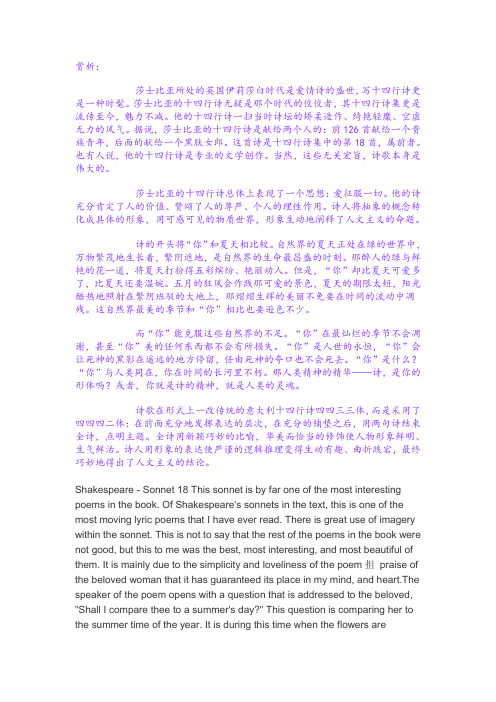
赏析:莎士比亚所处的英国伊莉莎白时代是爱情诗的盛世,写十四行诗更是一种时髦。
莎士比亚的十四行诗无疑是那个时代的佼佼者,其十四行诗集更是流传至今,魅力不减。
他的十四行诗一扫当时诗坛的矫柔造作、绮艳轻糜、空虚无力的风气。
据说,莎士比亚的十四行诗是献给两个人的:前126首献给一个贵族青年,后面的献给一个黑肤女郎。
这首诗是十四行诗集中的第18首,属前者。
也有人说,他的十四行诗是专业的文学创作。
当然,这些无关宏旨,诗歌本身是伟大的。
莎士比亚的十四行诗总体上表现了一个思想:爱征服一切。
他的诗充分肯定了人的价值、赞颂了人的尊严、个人的理性作用。
诗人将抽象的概念转化成具体的形象,用可感可见的物质世界,形象生动地阐释了人文主义的命题。
诗的开头将“你”和夏天相比较。
自然界的夏天正处在绿的世界中,万物繁茂地生长着,繁阴遮地,是自然界的生命最昌盛的时刻。
那醉人的绿与鲜艳的花一道,将夏天打扮得五彩缤纷、艳丽动人。
但是,“你”却比夏天可爱多了,比夏天还要温婉。
五月的狂风会作践那可爱的景色,夏天的期限太短,阳光酷热地照射在繁阴班驳的大地上,那熠熠生辉的美丽不免要在时间的流动中凋残。
这自然界最美的季节和“你”相比也要逊色不少。
而“你”能克服这些自然界的不足。
“你”在最灿烂的季节不会凋谢,甚至“你”美的任何东西都不会有所损失。
“你”是人世的永恒,“你”会让死神的黑影在遥远的地方停留,任由死神的夸口也不会死去。
“你”是什么?“你”与人类同在,你在时间的长河里不朽。
那人类精神的精华——诗,是你的形体吗?或者,你就是诗的精神,就是人类的灵魂。
诗歌在形式上一改传统的意大利十四行诗四四三三体,而是采用了四四四二体:在前面充分地发挥表达的层次,在充分的铺垫之后,用两句诗结束全诗,点明主题。
全诗用新颖巧妙的比喻,华美而恰当的修饰使人物形象鲜明、生气鲜活。
诗人用形象的表达使严谨的逻辑推理变得生动有趣、曲折跌宕,最终巧妙地得出了人文主义的结论。
Shakespeare - Sonnet 18 This sonnet is by far one of the most interesting poems in the book. Of Shakespeare's sonnets in the text, this is one of the most moving lyric poems that I have ever read. There is great use of imagery within the sonnet. This is not to say that the rest of the poems in the book were not good, but this to me was the best, most interesting, and most beautiful of them. It is mainly due to the simplicity and loveliness of the poem抯praise of the beloved woman that it has guaranteed its place in my mind, and heart.The speaker of the poem opens with a question that is addressed to the beloved, "Shall I compare thee to a summer's day?" This question is comparing her to the summer time of the year. It is during this time when the flowers areblooming, trees are full of leaves, the weather is warm, and it is generally thought of as an enjoyable time during the year. The following eleven lines in the poem are also dedicated to similar comparisons between the beloved and summer days. In lines 2 and 3, the speaker explains what mainly separates the young woman from the summer's day: she is "more lovely and more temperate." (Line 2) Summer's days tend toward extremes: they are sometimes shaken by "rough winds" (line3) which happens and is not always as welcoming as the woman. However in line 4, the speaker gives the feeling again that the summer months are often to short by saying, "And summer抯lease hath too short a date." In the summer days, the sun, "the eye of heaven" (line 5), often shines "too hot," or too dim, "his gold complexion dimmed" (line 6), that is there are many hot days during the summer but soon the sun begins to set earlier at night because autumn is approaching. Summer is moving along too quickly for the speaker, its time here needs to be longer, and it also means that the chilling of autumn is coming upon us because the flowers will soon be withering, as "every fair from fair sometime declines." (Line 7) The final portion of the sonnet tells how the beloved differs from the summer in various respects. Her beauty will be one that lasts forever, "Thy eternal summer shall not fade." (Line 9), and never end or die. In the couplet at the bottom, the speaker explains how that the beloved's beauty will accomplish this everlasting life unlike a summer. And it is because her beauty is kept alive in this poem, which will last forever. It will live "as long as men can breathe or eyes can see." (Line 13)On the surface, the poem is on the surface simply a statement of praise about the beauty of the beloved woman and perhaps summer to the speaker is sometimes too unpleasant with the extremes of windiness and heat that go along with it. However, the beloved in the poem is always mild and temperate by her nature and nothing at all like the summer. It is incidentally brought to life as being described as the "eye of heaven" with its "gold complexion". The imagery throughout the sonnet is simple and attainable to the reader, which is a key factor in understanding the poem. Then the speaker begins to describe the summer again with the "darling buds of May" giving way to the " summer抯lease", springtime moving into the warmth of the summer. The speaker then starts to promise to talk about this beloved, that is so great and awing that she is to live forever in this sonnet. The beloved is so great that the speaker will even go as far as to say that, "So long as men breathe, or eyes can see," the woman will live. The language is almost too simple when comparing it to the rest of Shakespeare抯sonnets; it is not heavy with alliteration or verse, and nearly every line is its own self-containedclause, almost every line ends with some punctuation that effects a pause. But it is this that makes Sonnet18 stand out for the rest in the book. It is much more attainable to understand and it allows for the reader to fully understand how great this beloved truly is because she may live forever in it. An important theme of the sonnet, as it is an important theme throughout much of the poetry in general, is the power of the speaker's poem to defy time and last forever. And so by doing this it is then carrying the beauty of the beloved down to future generations and eventually for al of eternity. The beloved's "eternal summer" shall not fade precisely because it is embodied in the sonnet: "So long as men can breathe or eyes can see," (line 13) the speaker writes in the couplet, "So long lives this, and this gives life to thee."(Line 14) With this the speaker is able to accomplish what many have done in poetry and that is to give the gift of an eternal life to someone that they believe is special and outshines everyone else around them. Perhaps it is because of a physical beauty that the speaker see, but I believe that it is more because of the internal beauty as seen in line 2, "Thou art more lovely and more temperate", that the beloved is deserving to live on forever.。
sonnet18诗歌解析
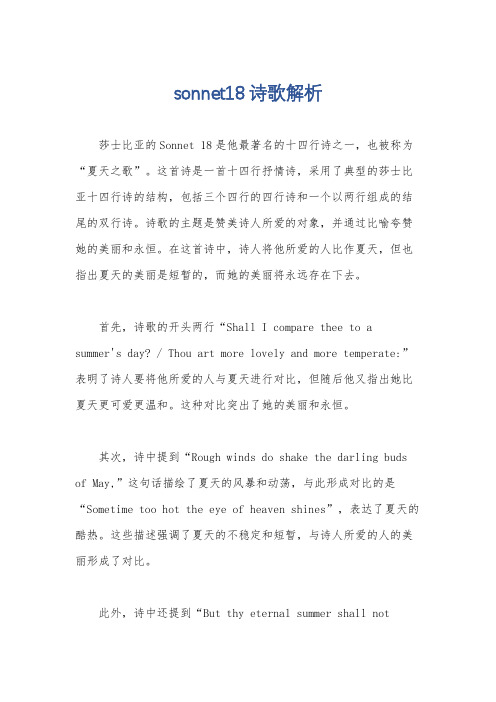
sonnet18诗歌解析莎士比亚的Sonnet 18是他最著名的十四行诗之一,也被称为“夏天之歌”。
这首诗是一首十四行抒情诗,采用了典型的莎士比亚十四行诗的结构,包括三个四行的四行诗和一个以两行组成的结尾的双行诗。
诗歌的主题是赞美诗人所爱的对象,并通过比喻夸赞她的美丽和永恒。
在这首诗中,诗人将他所爱的人比作夏天,但也指出夏天的美丽是短暂的,而她的美丽将永远存在下去。
首先,诗歌的开头两行“Shall I compare thee to a summer's day? / Thou art more lovely and more temperate:”表明了诗人要将他所爱的人与夏天进行对比,但随后他又指出她比夏天更可爱更温和。
这种对比突出了她的美丽和永恒。
其次,诗中提到“Rough winds do shake the darling buds of May,”这句话描绘了夏天的风暴和动荡,与此形成对比的是“Sometime too hot the eye of heaven shines”,表达了夏天的酷热。
这些描述强调了夏天的不稳定和短暂,与诗人所爱的人的美丽形成了对比。
此外,诗中还提到“But thy eternal summer shall notfade”,这句话表达了诗人对所爱人美丽永恒的信念,即使时间流逝,她的美丽也不会凋谢。
最后,诗歌的结尾两行“So long as men can breathe oreyes can see, / So long lives this, and this gives life to thee.”表达了诗人的信念,即只要人类存在,这首诗也将永存下去,而她的美丽也将因此而得以永生。
总的来说,Sonnet 18是一首赞美之歌,通过对比夏天的短暂和变化与所爱人的永恒美丽,表达了诗人对所爱人的赞美和珍视之情。
这首诗以其优美的语言和深刻的意境,成为了莎士比亚诗歌中的经典之作。
十四行诗之十八译文
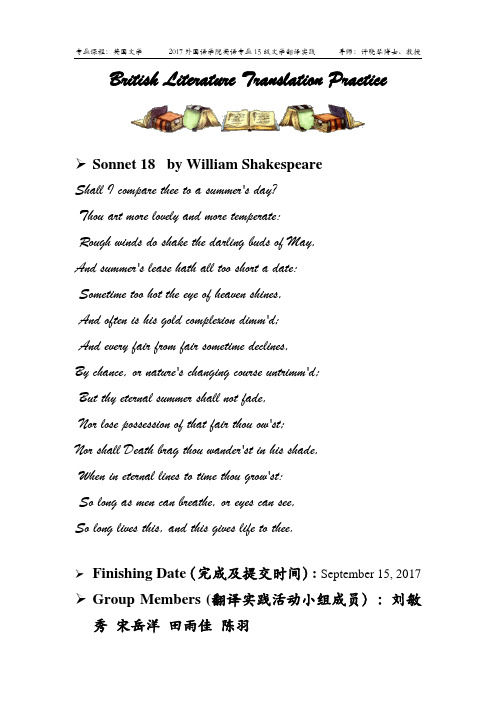
Sonnet 18 by William ShakespeareShall I compare thee to a summer's day?Thou art more lovely and more temperate:Rough winds do shake the darling buds of May,And summer's lease hath all too short a date:Sometime too hot the eye of heaven shines,And often is his gold complexion dimm'd;And every fair from fair sometime declines,By chance, or nature's changing course untrimm'd;But thy eternal summer shall not fade,Nor lose possession of that fair thou ow'st;Nor shall Death brag thou wander'st in his shade,When in eternal lines to time thou grow'st:So long as men can breathe, or eyes can see,So long lives this, and this gives life to thee.Finishing Date(完成及提交时间): September 15, 2017 Group Members (翻译实践活动小组成员):刘敏秀宋岳洋田雨佳陈羽Chinese Translation(译文)这夏,真的可以与你媲美吗?你时而迷人,时而温婉。
刚风落了五月的初蕾,夏日的生命未免太短。
莎士比亚的第十八首十四行诗

莎士比亚的第十八首十四行诗莎士比亚的第18首十四行诗是他的一首著名Sonnet(十四行诗),以下是该诗的原文:Shall I compare thee to a summer's day? Thou art more lovely and more temperate: Rough winds do shake the darling buds of May, And summer's lease hath all too short a date: Sometime too hot the eye of heaven shines, And often is his gold complexion dimmed; And every fair from fair sometime declines, By chance or nature's changing course untrimmed; But thy eternal summer shall not fade Nor lose possession of that fair thou owest; Nor shall Death brag thou wanderest in his shade, When in eternal lines to time thou growest: So long as men can breathe or eyes can see, So long lives this, and this gives life to thee.这首诗是一首表达爱情赞美的十四行诗,诗人将心爱之人与夏日做了比较,认为她比夏天更加美丽和温和,不会随着时间的流逝而变淡,也不会被死亡所征服,因为她将永远存在于这首诗中。
这首诗以其深情而著名,被广泛阅读和欣赏。
SONNET 18赏析
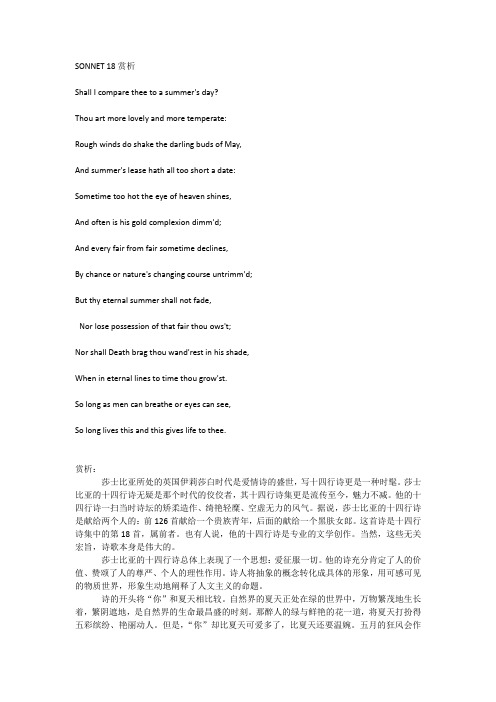
SONNET 18赏析Shall I compare thee to a summer's day?Thou art more lovely and more temperate:Rough winds do shake the darling buds of May,And summer's lease hath all too short a date:Sometime too hot the eye of heaven shines,And often is his gold complexion dimm'd;And every fair from fair sometime declines,By chance or nature's changing course untrimm'd;But thy eternal summer shall not fade,Nor lose possession of that fair thou ows't;Nor shall Death brag thou wand'rest in his shade,When in eternal lines to time thou grow'st.So long as men can breathe or eyes can see,So long lives this and this gives life to thee.赏析:莎士比亚所处的英国伊莉莎白时代是爱情诗的盛世,写十四行诗更是一种时髦。
莎士比亚的十四行诗无疑是那个时代的佼佼者,其十四行诗集更是流传至今,魅力不减。
他的十四行诗一扫当时诗坛的矫柔造作、绮艳轻糜、空虚无力的风气。
据说,莎士比亚的十四行诗是献给两个人的:前126首献给一个贵族青年,后面的献给一个黑肤女郎。
这首诗是十四行诗集中的第18首,属前者。
sonnet 18 夏日

The Sonnets 18 十四行诗第十八首
夏日 能不能让我来把你比拟做夏日? 你可是更加温和,更加可爱: 狂风会吹落五月里开的好花儿, 夏季的生命又未免结束得太快: 有时候苍天的巨眼照得太灼热, 他那金彩的脸色也会被遮暗; 每一样美呀,总会离开美而凋落, 被时机或者自然的代谢所摧残; 但是你永久的夏天决不会凋枯, 你永远不会失去你美的仪态; 死神也无缘将你幽禁, 你将在不朽的诗中与时间同在; 只要人类在呼吸,眼睛看得见, 我这诗就活着,使你的生命绵延. 梁宗岱译文
英美文学选读诗歌翻译

SONNET 18 (William Shakespeare)十四行诗Shall I compare thee to a summer's day?Thou art more lovely and more temperate: Rough winds do shake the darling buds of May, And summer's lease hath all too short a date: Sometime too hot the eye of heaven shines,A nd often is his gold complexion dimm’d,And every fair from fair sometime declines,By chance, or nature's changing course untrimm’d: But thy eternal summer shall not fadeNor lose possession of that fair thou ow’st,Nor shall Death brag thou wander’st in his shade, When in eternal lines to time thou grow’st.So long as men can breathe or eyes can see,So long lives this, and this gives life to thee.我怎么能够将你比作夏天?你比夏天更美丽温婉。
狂风将五月的蓓蕾凋残,夏日的勾留何其短暂。
休恋那烈日当空,转眼会云雾迷蒙;休叹那百花凋零,摧折于无常天命;唯有你永恒的夏日长新,你的美貌亦毫发无损。
死神也无缘将你幽禁,你在我永恒的诗中长存。
只要世间尚有人吟诵我的诗篇,这诗就将不朽,永葆你的芳颜。
Structure: Runs in iambic pentameter, rhymed ABAB CDCD EFEF GG.1. What is the theme of this sonnet? Eternality, beauty, immorality2. Why is the speaker’s beloved more lovely than a summer’s day?One thing he is thinking of is how short lived summer is. Another reason he says his love is more beautiful than a summer day is that the summer whether can be harsh, making nature look less beautiful than it does otherwise. 3.There is obviously a shift of tone and subject matter in line 9. Describe such a shift.The author compared the loved one, just in a soft and sentimental tone similar to many love sonnets, to a summer’s day in the first 4 lines, while, in the following 4, developing this concept to the p oor power of people falling to retain the fair against Nature. But in line 9, the author reversed it in a more emotional and definite tone to express the eternal youth of the loved ones.I Hear America Singing (Walt Whitman) 我听见美国在歌唱(沃尔特·惠特曼)I hear America singing, the varied carols I hear.Those of mechanics, each one singing his as it should be blithe and strong,The carpenter singing his as he measures his plank or beam,The mason singing his as he makes ready for work,or leaves off work,The boatman singing what belongs to him in his boat, the deckhand singing on the steamboat deck,The shoemaker singing as he sits on his bench, the hatter singing as he stands,The wood-cutter's song, the ploughboy's on his way in the morning, or at noon intermission or at sundown,The delicious singing of the mother, or of the young wife at work, or of the girl sewing or washing,Each singing what belongs to him or her and to none else,The day what belongs to the day--at night the party of young fellows, robust, friendly,Singing with open mouths their strong melodious songs.我听见美国在歌唱,我听见各种不同的颂歌机器匠在歌唱着,他们每人歌唱着他的愉快而强健的歌,木匠在歌唱着,一边比量着他的木板或梁木,泥瓦匠在歌唱着,当他准备工作或停止工作的时候,船家歌唱着他船里所有的一切,水手在汽艇的甲板上歌唱着,鞋匠坐在他的工作凳上歌唱,帽匠歌唱着,站在那里工作,伐木者、犁田青年们歌唱着,当他们每天早晨走在路上,或者午间歇息,或到了日落的时候,我更听到母亲的美妙的歌,正在操作的年轻的妻子们的或缝衣或洗衣的女孩子们的歌,每人歌唱属于他或她而不是属于任何别人的一切,白昼歌唱白昼所有的,晚间,强壮而友爱的青年们的集会,张嘴唱着他们的强健而和谐的歌。
莎士比亚十四行诗_Sonnet_18
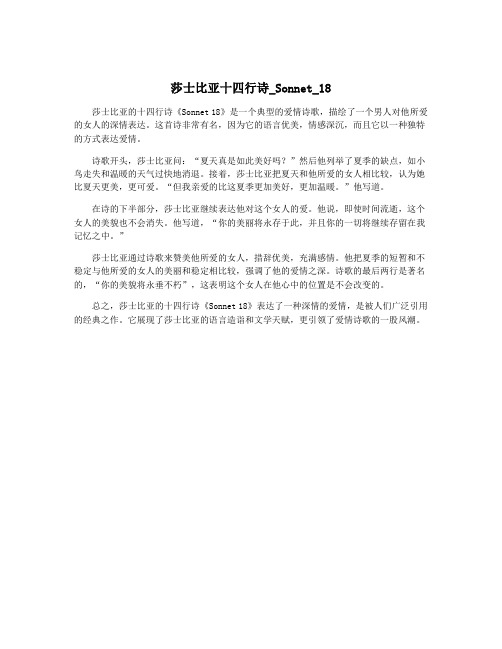
莎士比亚十四行诗_Sonnet_18
莎士比亚的十四行诗《Sonnet 18》是一个典型的爱情诗歌,描绘了一个男人对他所爱的女人的深情表达。
这首诗非常有名,因为它的语言优美,情感深沉,而且它以一种独特的方式表达爱情。
诗歌开头,莎士比亚问:“夏天真是如此美好吗?”然后他列举了夏季的缺点,如小鸟走失和温暖的天气过快地消退。
接着,莎士比亚把夏天和他所爱的女人相比较,认为她比夏天更美,更可爱。
“但我亲爱的比这夏季更加美好,更加温暖。
”他写道。
在诗的下半部分,莎士比亚继续表达他对这个女人的爱。
他说,即使时间流逝,这个女人的美貌也不会消失。
他写道,“你的美丽将永存于此,并且你的一切将继续存留在我记忆之中。
”
莎士比亚通过诗歌来赞美他所爱的女人,措辞优美,充满感情。
他把夏季的短暂和不稳定与他所爱的女人的美丽和稳定相比较,强调了他的爱情之深。
诗歌的最后两行是著名的,“你的美貌将永垂不朽”,这表明这个女人在他心中的位置是不会改变的。
总之,莎士比亚的十四行诗《Sonnet 18》表达了一种深情的爱情,是被人们广泛引用的经典之作。
它展现了莎士比亚的语言造诣和文学天赋,更引领了爱情诗歌的一股风潮。
sonnet 18 中文格律诗
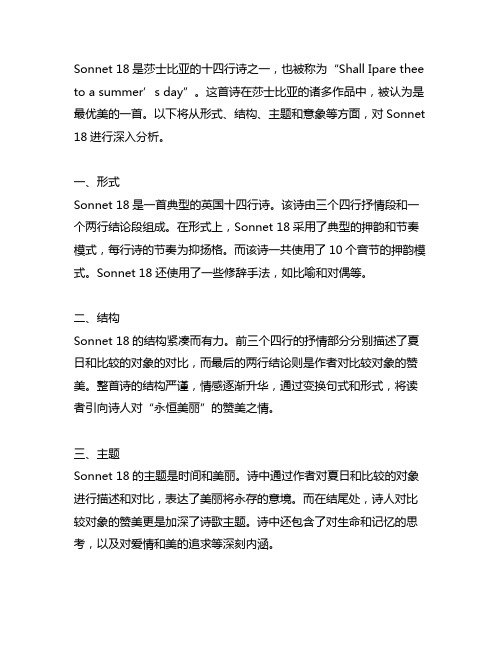
Sonnet 18是莎士比亚的十四行诗之一,也被称为“Shall Ipare thee to a summer’s day”。
这首诗在莎士比亚的诸多作品中,被认为是最优美的一首。
以下将从形式、结构、主题和意象等方面,对Sonnet 18进行深入分析。
一、形式Sonnet 18是一首典型的英国十四行诗。
该诗由三个四行抒情段和一个两行结论段组成。
在形式上,Sonnet 18采用了典型的押韵和节奏模式,每行诗的节奏为抑扬格。
而该诗一共使用了10个音节的押韵模式。
Sonnet 18还使用了一些修辞手法,如比喻和对偶等。
二、结构Sonnet 18的结构紧凑而有力。
前三个四行的抒情部分分别描述了夏日和比较的对象的对比,而最后的两行结论则是作者对比较对象的赞美。
整首诗的结构严谨,情感逐渐升华,通过变换句式和形式,将读者引向诗人对“永恒美丽”的赞美之情。
三、主题Sonnet 18的主题是时间和美丽。
诗中通过作者对夏日和比较的对象进行描述和对比,表达了美丽将永存的意境。
而在结尾处,诗人对比较对象的赞美更是加深了诗歌主题。
诗中还包含了对生命和记忆的思考,以及对爱情和美的追求等深刻内涵。
四、意象Sonnet 18使用了丰富的意象,如夏日、阳光、金色、气候、自然等。
这些意象不仅仅是诗中的描写,更是诗人对美好事物的赞美。
通过对自然界的描绘,诗人塑造出了诗中比较对象的完美形象,表达了作者内心深处对美好事物的向往和追求。
Sonnet 18无论从形式、结构、主题还是意象等方面都展现了莎士比亚在诗歌创作上的卓越才华和深厚功底。
它以清晰的逻辑和深刻的内涵,表达了诗人对美的赞美和对永恒美好的追求。
这使得Sonnet 18成为了莎士比亚诗歌创作的代表作之一,同时也成为了世界文学史上不朽的经典之作。
Sonnet 18是英国文学史上不朽的经典之作,其中蕴含了深刻的人文情感和对美好事物的赞美。
从古至今,它一直是文学爱好者和学者们津津乐道的对象。
第18首十四行诗

Shall I compare thee to a summer’s day?Thou art more lovely and more temperate:Rough winds do shake the darling buds of May, And summer’s lease hath all too short a date: Sometime too hot the eye of heaven shines,And often is his gold complexion dimm’d;And every fair from fair sometime declines,By chance or nature’s changing course untrimm’dBut thy eternal summer shall not fadeNor lose possession of that fair thou owest;Nor shall Death brag thou wander’st in his shade, When in eternal lines to time thou growest:So long as men can breathe or eyes can see,So long lives this and this gives life to thee.译文1:让我如何来把你比作夏天?你比夏天还要可爱,而且柔软:暴风的五月摧残了鲜嫩的蓓蕾,夏天那无情的赁期,又实在是太短:有时候太阳的照耀又会太烈,而且那辉煌的面孔也难免乌云的遮掩;每一种美丽,都会有衰谢的一天,或者由于无常,或者因为自然。
可是你的夏天却不会凋谢,你的美丽,也永远不会消散;虽然骄傲的死亡可以在夏天投下阴影,但是不朽的诗行将照亮你的鲜妍。
只要有一个人还在呼吸,还能阅读,这首诗就活着,让你的青春生动依然。
- 1、下载文档前请自行甄别文档内容的完整性,平台不提供额外的编辑、内容补充、找答案等附加服务。
- 2、"仅部分预览"的文档,不可在线预览部分如存在完整性等问题,可反馈申请退款(可完整预览的文档不适用该条件!)。
- 3、如文档侵犯您的权益,请联系客服反馈,我们会尽快为您处理(人工客服工作时间:9:00-18:30)。
II OBJECTIVES: A)Introduction to poetry B)Introduction to sonnet C)Study of Sonnet 18 D)Assignment
Definition of Poetry * distinctive style and rhythm; a genre of literature. * a concentrated imaginative awareness of experience
Lyric is a brief subjective poem strongly marked by imagination, melody and emotion, and creating a single unified impression.
Narrative poetry
Narrative poetry is one that tells a story or presents a narrative, whether simple or complex, long or short. Epics, ballads and metrical romances are among the many kinds of narrative poems.
Rhythm comes from the regular pattern of the stress and non-stress. According to the rules of the arrangement of the stresses and non-stresses, the most commonly used meter of English poetry is divided into: A. Iambic foot (Iamb) ( ∨ —) ( ∨ / ) 抑扬格
Rhythm
Poetry is often considered as the rhythmic
creation of beauty (Edgar Allen Poe). A poem is divided into stanza or strophe( 诗 节 ), which is subdivided into verse or line( 行 ). Each line is divided into several feet(音步). Foot is arranged according to the stress, and this forms the meter (格 律). In a foot, “-” symbolizes stress, which is called “ 扬 ” in Chinese, and “ˇ”symbolizes non-stress, which is called “抑” in Chinese.
D. Dactylic foot (Dacty1) (—∨ ∨ ) (/ ∨ ∨ ) 扬抑抑格 Slowly the mist o’er the meadow was creeping.
Dramatic poetry
A third kind of poetry is dramatic poetry which is written in the form of a speech of an individual character to an imaginary audience; it compresses into a single vivid scene a narrative sense of the speaker’s history and psychological insight into his character. This kind of poetry, as the term suggests, employs dramatic form or some element of dramatic technique.
in language
* a special emotional response through its meaning,
sound, and rhythm.
Types of Poetry
Lyric poetry Narrative poetry Dramatic poetry
Lyric poetry
If winter comes, can spring be far behind? B. Trochaic foot (Trochee) (— ∨ ) (/ ∨ ) 扬抑格
Every little stream is bright,
C. Anapestic foot (Anapest) ) ( ∨ ∨ —) ( ∨ ∨ / ) 抑抑扬格 For the moon never beams without bringing me dreams.
ห้องสมุดไป่ตู้
The Language in Poetry
The Language in poetry may differ still further from that of prose. Since the function of poetry is to present IMAGES concretely, it is the responsibility of the poet to select language that succeeds in making those IMAGES concrete and the special words rich in connotative value and carrying implications of sound, color, and action— these are the special stock of the genuine POET.
